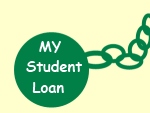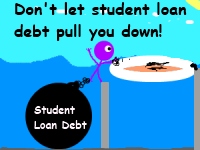

Grants, Scholarships, and Loan$
www.EducationDx.com
What if I cannot get enough grants and scholarships?

Grants and Scholarships--
Then
Then
Student College Loans
EducationDx
©2016, 2025
©2016, 2025
EducationDx
is a
FREE
Website
is a
FREE
Website

It is possible for some students to fund the cost of education without having to take out student college loans or take on agonizing debt. There are taxpayer funded grants as well as grants and scholarships available through private organizations, nonprofits and from most colleges. However, if you still need to supplement your college education even after you obtain grants and scholarships, you may have to take on a student college loan.
Everyone should start by filling out a FAFSA (Free Application for Federal Student Aid) application. Do this even if you "think" you don't qualify for any grants or government loans!


The financial concerns of the whole family need to be considered if you are thinking about taking on a student college loan. It is important to understand all the terms of lending agencies such as the schedule of repayment and interest rates, before signing or making a commitment. You need to read the contract and ask questions in order to prevent any surprises after you sign.
?
"Everybody is taking on loans--what's the big deal?"
Compromise
Sallie Mae
*
Sallie Mae, the Student Loan Marketing Association (SLMA) was established by Congress in 1972. Sallie Mae was created to increase the supply and lower the cost of student loans. Sallie Mae was created with a federal charter and an implied taxpayer backstop to provide a secondary market for student loans.
Sallie Mae began privatizing in 1997, and was no longer a government sponsored enterprise by 2004. SLM Corporation known as Sallie Mae (NYSE: SLM), is the nation's only financial services company specializing in education. Sallie Mae offers services to a range of institutional clients, including colleges and universities, student loan guarantors and state and federal agencies.
SLM Corporation is engaged in the business of originating, servicing and collecting student loans and/or their parents to finance the cost of their education. The Company provides funding, delivery and servicing support for education loans in the United States through the participation in the Federal Family Education Loan Program (FFELP), as a servicer of loans for the Department of Education (ED), and through its non-federally guaranteed Private Education Loan programs.
* This is an article providing information about Sallie Mae. It is not an endorsement. Go to their website if you need more information.
Sallie Mae began privatizing in 1997, and was no longer a government sponsored enterprise by 2004. SLM Corporation known as Sallie Mae (NYSE: SLM), is the nation's only financial services company specializing in education. Sallie Mae offers services to a range of institutional clients, including colleges and universities, student loan guarantors and state and federal agencies.
SLM Corporation is engaged in the business of originating, servicing and collecting student loans and/or their parents to finance the cost of their education. The Company provides funding, delivery and servicing support for education loans in the United States through the participation in the Federal Family Education Loan Program (FFELP), as a servicer of loans for the Department of Education (ED), and through its non-federally guaranteed Private Education Loan programs.
* This is an article providing information about Sallie Mae. It is not an endorsement. Go to their website if you need more information.
Federal Student Loans
The federal government is the sole provider of federal student loans because of a law passed in 2010. There are Direct Stafford Loans: Direct Subsidized and Direct Unsubsidized.
You can apply by completing a FAFSA application--the same one that you used to apply for a federal grant.

Work Study-Federal Work-Study (FWS)
Work study is where a student works to help pay for their college education. It can be part of a financial aid package paired with a scholarship or grant. Work study is usually done on the school campus, and is a typical form of financial aid at many universities and colleges.
The student will work for the school in some department for about ten to fifteen hours per week. It could be working as a custodian, helping in the library or other clerical help. It is a good way to help the student become responsible, and help them actually work to help finance their college education.






<<<Back
Beginning
Beginning

Most people borrow money for college with the intention of paying it back. Unfortunately, sometimes unpredictable things happen:
*They receive no job offers in their field after graduation.
*They end up in a job in which they are overqualified and underpaid.
*They may lose their present part or full-time job.
*They face highly competitive hiring because an abundance of college degrees in many areas.
*They experience unexpected medical and insurance bills.
*They may lose someone through death or divorce who was going to help pay the loan.
*Their car or house needs costly repairs not covered by insurance.
*Other _________(you fill in the blank!)
That is why it is good to think ahead, and "plan for the unexpected." If you do not plan, you might "have to" default (not pay) on your loan. This has some serious consequences.
Also, sometimes a student miscalculates the worth of a degree in certain fields (or from an expensive school) or just faces a slow or declining market in their area of study.
"I always wanted to be a singer, so I took up music in college. It cost over $100,000 for a four-year degree, and I now make about $15,000 a year making presentations to schools. I probably could have gotten the job without a degree."
"I went to an Ivy League school. A colleague attended a nice state college to become a teacher. We both were hired for the same amount of money in the same school district."
"I went to an expensive private school on a scholarship and some loans. I majored in history. I cannot find a job in history. To teach history, I have to return to college to take the teaching courses."
"I completed pre-med in four years at great expense, got my degree (honors), but now cannot get admitted to any medical school [in this country]. I can wait or try to find a sales job with some pharmaceutical company."
"I didn't have to give up my dream career, but I did make some changes. I switched to a more affordable college, when I got over the 'ego trip' of going to a big university. I am a professional, but nobody looks at my degree on the wall and questions if I would be any better if I went to an Ivy League school. I can't imagine the professors being any better there than the ones I had."
Questions to ask:
*"Will I be able to repay this college loan with the type of job I might get?"
*"How long will that take, and how will that affect my lifestyle?"
*"Can I make some changes in my college plans, that won't affect my ultimate goals, but will enable me to save money?"
Think about:
*Defaulting (not paying) on a student loan means you will not be able to receive further federal aid and less likely to get loans or credit cards. You may face higher interest rates, and the government may take deduct money from your paychecks and tax refunds.
*How much do you value: the college experience of going away from home (out of state), private vs. public, college vs. university, commuting, dorm life or off campus housing?
You need to analyze your situation and career goals. This may lead you to search and apply for more scholarships and grants that you won't need to repay. If you can get enough scholarships and grants, it is possible to help fund the cost of your education without having to take out large or any loans. Remember, there are scholarships/grants available for things other than just academics.
There are a few websites that can help you learn how and where to look for grants, scholarships and loans. Start Here>>>
*They receive no job offers in their field after graduation.
*They end up in a job in which they are overqualified and underpaid.
*They may lose their present part or full-time job.
*They face highly competitive hiring because an abundance of college degrees in many areas.
*They experience unexpected medical and insurance bills.
*They may lose someone through death or divorce who was going to help pay the loan.
*Their car or house needs costly repairs not covered by insurance.
*Other _________(you fill in the blank!)
That is why it is good to think ahead, and "plan for the unexpected." If you do not plan, you might "have to" default (not pay) on your loan. This has some serious consequences.
Also, sometimes a student miscalculates the worth of a degree in certain fields (or from an expensive school) or just faces a slow or declining market in their area of study.
"I always wanted to be a singer, so I took up music in college. It cost over $100,000 for a four-year degree, and I now make about $15,000 a year making presentations to schools. I probably could have gotten the job without a degree."
"I went to an Ivy League school. A colleague attended a nice state college to become a teacher. We both were hired for the same amount of money in the same school district."
"I went to an expensive private school on a scholarship and some loans. I majored in history. I cannot find a job in history. To teach history, I have to return to college to take the teaching courses."
"I completed pre-med in four years at great expense, got my degree (honors), but now cannot get admitted to any medical school [in this country]. I can wait or try to find a sales job with some pharmaceutical company."
"I didn't have to give up my dream career, but I did make some changes. I switched to a more affordable college, when I got over the 'ego trip' of going to a big university. I am a professional, but nobody looks at my degree on the wall and questions if I would be any better if I went to an Ivy League school. I can't imagine the professors being any better there than the ones I had."
Questions to ask:
*"Will I be able to repay this college loan with the type of job I might get?"
*"How long will that take, and how will that affect my lifestyle?"
*"Can I make some changes in my college plans, that won't affect my ultimate goals, but will enable me to save money?"
Think about:
*Defaulting (not paying) on a student loan means you will not be able to receive further federal aid and less likely to get loans or credit cards. You may face higher interest rates, and the government may take deduct money from your paychecks and tax refunds.
*How much do you value: the college experience of going away from home (out of state), private vs. public, college vs. university, commuting, dorm life or off campus housing?
You need to analyze your situation and career goals. This may lead you to search and apply for more scholarships and grants that you won't need to repay. If you can get enough scholarships and grants, it is possible to help fund the cost of your education without having to take out large or any loans. Remember, there are scholarships/grants available for things other than just academics.
There are a few websites that can help you learn how and where to look for grants, scholarships and loans. Start Here>>>
Be Smart!
Avoid taking on a loan--if you can!
Borrow the smallest amount--if you must!
Avoid taking on a loan--if you can!
Borrow the smallest amount--if you must!
Even a $500 scholarship means $500 less that you will have to repay!
Math Problem
The monthly payment on a $25,000 student loan is approximately $280 (assuming 6.8% interest and a 10-year repayment plan.
"If my take home pay is $2000 a month, how much does that leave me for rent ($600), car payment ($300), food, insurance, repairs, utilities, fuel, clothes, $$$......"
Huh?
The monthly payment on a $25,000 student loan is approximately $280 (assuming 6.8% interest and a 10-year repayment plan.
"If my take home pay is $2000 a month, how much does that leave me for rent ($600), car payment ($300), food, insurance, repairs, utilities, fuel, clothes, $$$......"
Huh?


This is a FREE information site!
www.EducationDx.com
Note: Larger computer screens will show larger materials!
Grants, Scholarships, and Loan$
Grants and Scholarships--
Then Student College Loans
Then Student College Loans
It is possible for some students to fund the cost of education without having to take out student college loans or take on agonizing debt. There are taxpayer funded grants as well as grants and scholarships available through private organizations, nonprofits and from most colleges. However, if you still need to supplement your college education even after you obtain grants and scholarships, you may have to take on a student college loan.


The financial concerns of the whole family need to be considered if you are thinking about taking on a student college loan. It is important to understand all the terms of lending agencies such as the schedule of repayment and interest rates, before signing or making a commitment. You need to read the contract and ask questions in order to prevent any surprises after you sign.
Everyone should start by filling out a FAFSA (Free Application for Federal Student Aid) application. Do this even if you "think" you don't qualify for any grants or government loans!



Most people borrow money for college with the intention of paying it back. Unfortunately, sometimes unpredictable things happen:
*They receive no job offers in their field after graduation.
*They end up in a job in which they are overqualified and underpaid.
*They may lose their present part or full-time job.
*They face highly competitive hiring because an abundance of college degrees in many areas.
*They experience unexpected medical and insurance bills.
*They may lose someone through death or divorce who was going to help pay the loan.
*Their car or house needs costly repairs not covered by insurance.
*Other _________(you fill in the blank!)
That is why it is good to think ahead, and "plan for the unexpected." If you do not plan, you might "have to" default (not pay) on your loan. This has some serious consequences.
Also, sometimes a student miscalculates the worth of a degree in certain fields (or from an expensive school) or just faces a slow or declining market in their area of study.
"I always wanted to be a singer, so I took up music in college. It cost over $100,000 for a four-year degree, and I now make about $15,000 a year making presentations to schools. I probably could have gotten the job without a degree."
"I went to an Ivy League school. A colleague attended a nice state college to become a teacher. We both were hired for the same amount of money in the same school district."
"I went to an expensive private school on a scholarship and some loans. I majored in history. I cannot find a job in history. To teach history, I have to return to college to take the teaching courses."
"I completed pre-med in four years at great expense, got my degree (honors), but now cannot get admitted to any medical school [in this country]. I can wait or try to find a sales job with some pharmaceutical company."
"I didn't have to give up my dream career, but I did make some changes. I switched to a more affordable college, when I got over the 'ego trip' of going to a big university. I am a professional, but nobody looks at my degree on the wall and questions if I would be any better if I went to an Ivy League school. I can't imagine the professors being any better there than the ones I had."
Questions to ask:
*"Will I be able to repay this college loan with the type of job I might get?"
*"How long will that take, and how will that affect my lifestyle?"
*"Can I make some changes in my college plans, that won't affect my ultimate goals, but will enable me to save money?"
Think about:
*Defaulting (not paying) on a student loan means you will not be able to receive further federal aid and less likely to get loans or credit cards. You may face higher interest rates, and the government may take deduct money from your paychecks and tax refunds.
*How much do you value: the college experience of going away from home (out of state), private vs. public, college vs. university, commuting, dorm life or off campus housing?
You need to analyze your situation and career goals. This may lead you to search and apply for more scholarships and grants that you won't need to repay. If you can get enough scholarships and grants, it is possible to help fund the cost of your education without having to take out large or any loans. Remember, there are scholarships/grants available for things other than just academics.
There are a few websites that can help you learn how and where to look for grants, scholarships and loans.
Start Here>>>
*They receive no job offers in their field after graduation.
*They end up in a job in which they are overqualified and underpaid.
*They may lose their present part or full-time job.
*They face highly competitive hiring because an abundance of college degrees in many areas.
*They experience unexpected medical and insurance bills.
*They may lose someone through death or divorce who was going to help pay the loan.
*Their car or house needs costly repairs not covered by insurance.
*Other _________(you fill in the blank!)
That is why it is good to think ahead, and "plan for the unexpected." If you do not plan, you might "have to" default (not pay) on your loan. This has some serious consequences.
Also, sometimes a student miscalculates the worth of a degree in certain fields (or from an expensive school) or just faces a slow or declining market in their area of study.
"I always wanted to be a singer, so I took up music in college. It cost over $100,000 for a four-year degree, and I now make about $15,000 a year making presentations to schools. I probably could have gotten the job without a degree."
"I went to an Ivy League school. A colleague attended a nice state college to become a teacher. We both were hired for the same amount of money in the same school district."
"I went to an expensive private school on a scholarship and some loans. I majored in history. I cannot find a job in history. To teach history, I have to return to college to take the teaching courses."
"I completed pre-med in four years at great expense, got my degree (honors), but now cannot get admitted to any medical school [in this country]. I can wait or try to find a sales job with some pharmaceutical company."
"I didn't have to give up my dream career, but I did make some changes. I switched to a more affordable college, when I got over the 'ego trip' of going to a big university. I am a professional, but nobody looks at my degree on the wall and questions if I would be any better if I went to an Ivy League school. I can't imagine the professors being any better there than the ones I had."
Questions to ask:
*"Will I be able to repay this college loan with the type of job I might get?"
*"How long will that take, and how will that affect my lifestyle?"
*"Can I make some changes in my college plans, that won't affect my ultimate goals, but will enable me to save money?"
Think about:
*Defaulting (not paying) on a student loan means you will not be able to receive further federal aid and less likely to get loans or credit cards. You may face higher interest rates, and the government may take deduct money from your paychecks and tax refunds.
*How much do you value: the college experience of going away from home (out of state), private vs. public, college vs. university, commuting, dorm life or off campus housing?
You need to analyze your situation and career goals. This may lead you to search and apply for more scholarships and grants that you won't need to repay. If you can get enough scholarships and grants, it is possible to help fund the cost of your education without having to take out large or any loans. Remember, there are scholarships/grants available for things other than just academics.
There are a few websites that can help you learn how and where to look for grants, scholarships and loans.
Start Here>>>
Even a $500 scholarship means $500 less that you will have to repay!
Math Problem
The monthly payment on a $25,000 student loan is approximately $280 (assuming 6.8% interest and a 10-year repayment plan.
"If my take home pay is $2000 a month, how much does that leave me for rent ($600), car payment ($300), food, insurance, repairs, utilities, fuel, clothes, $$$......"
Huh?
The monthly payment on a $25,000 student loan is approximately $280 (assuming 6.8% interest and a 10-year repayment plan.
"If my take home pay is $2000 a month, how much does that leave me for rent ($600), car payment ($300), food, insurance, repairs, utilities, fuel, clothes, $$$......"
Huh?
Work Study-Federal Work-Study (FWS)
Work study is where a student works to help pay for their college education. It can be part of a financial aid package paired with a scholarship or grant. Work study is usually done on the school campus, and is a typical form of financial aid at many universities and colleges.
The student will work for the school in some department for about ten to fifteen hours per week. It could be working as a custodian, helping in the library or other clerical help. It is a good way to help the student become responsible, and help them actually work to help finance their college education.

EducationDx
©2016, 2025
©2016, 2025


Disclosure:
Some links on this website are associate links and are used to help illustrate what an item looks like, and you can decide if you want to just look or purchase the item. "As an Amazon Associate, I earn from qualifying purchases." We receive a small commission (that helps support this website) if you actually purchase from this company, but the price to you remains the same.
You can hover over any link to see if it is an Amazon link, if this matters, or a link to a page on this website or to a reference page, e.g., Smithsonian Institution, bookmark on this website, etc.
Some links on this website are associate links and are used to help illustrate what an item looks like, and you can decide if you want to just look or purchase the item. "As an Amazon Associate, I earn from qualifying purchases." We receive a small commission (that helps support this website) if you actually purchase from this company, but the price to you remains the same.
You can hover over any link to see if it is an Amazon link, if this matters, or a link to a page on this website or to a reference page, e.g., Smithsonian Institution, bookmark on this website, etc.
Amazon Links
Disclosure:
Some links on this website are associate links and are used to help illustrate what an item looks like, and you can decide if you want to just look or purchase the item. "As an Amazon Associate, I earn from qualifying purchases." We receive a small commission (that helps support this website) if you actually purchase from this company, but the price to you remains the same.
You can hover over any link to see if it is an Amazon link, if this matters, or a link to a page on this website or to a reference page, e.g., Smithsonian Institution, bookmark on this website, etc.
Some links on this website are associate links and are used to help illustrate what an item looks like, and you can decide if you want to just look or purchase the item. "As an Amazon Associate, I earn from qualifying purchases." We receive a small commission (that helps support this website) if you actually purchase from this company, but the price to you remains the same.
You can hover over any link to see if it is an Amazon link, if this matters, or a link to a page on this website or to a reference page, e.g., Smithsonian Institution, bookmark on this website, etc.

Amazon Links

Sponsored Link
Sponsored Link